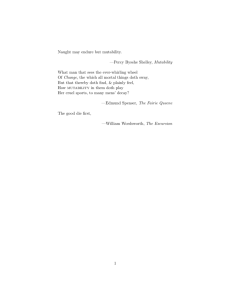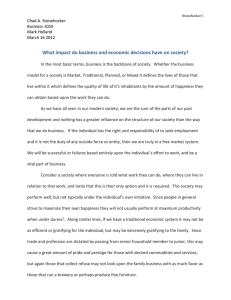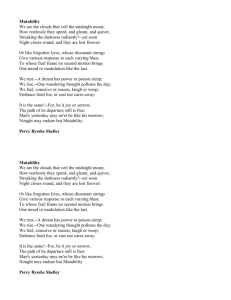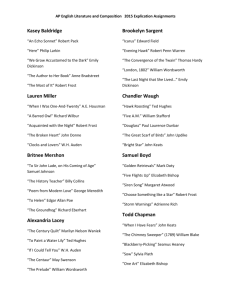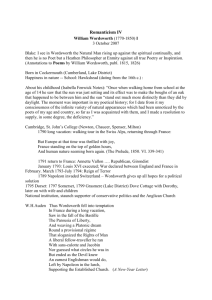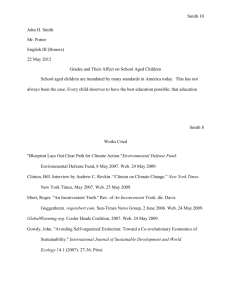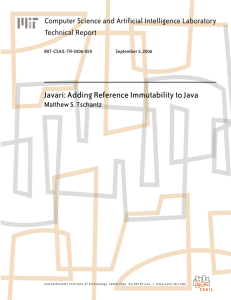William Wordsworth: Life, Poetry & Mutability Analysis
advertisement
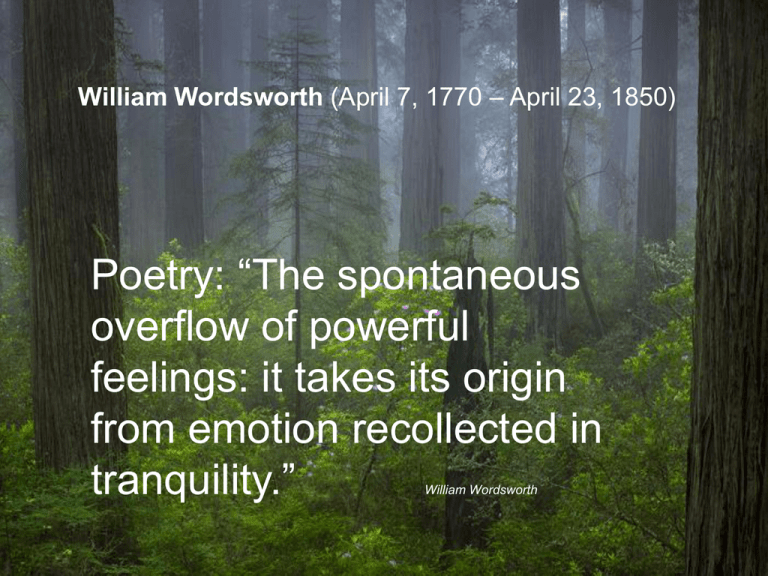
William Wordsworth (April 7, 1770 – April 23, 1850) Poetry: “The spontaneous overflow of powerful feelings: it takes its origin from emotion recollected in tranquility.” William Wordsworth • Mother passed away when he was 8 and had limited contact with his father. • Father did teach him some poetry including Shakespeare and Spencer. • Young William used his father’s extensive library. • Moves to France and falls in love with Annette Vallon- they conceive a daughter before William must leave France during the reign of terror (1793-1794). •Returns to France for visitation and restitution. • Wordsworth was England's Poet Laureate from 1843 until his death in 1850. Styles and Themes •Rejected the formal poetic styles of 17th and 18th Century Poets… He wanted to use the language “really used by men.” •Training required to be a poet: "habits of meditation.” •Common situations of Common life. the nature of the poet as compared to other people "nothing differing in kind from other men, but only in degree" "more lively sensibility“ “greater knowledge of human nature“ "more comprehensive soul" Pantheism • Greek word origin… πάν (pan) = everything θεός (theos) = God is all. Origins of concept are based deeply in Judaism, Hinduism, Animism, Neopaganism, and Christianity Biblical pantheism, which is expressed in the writings of the Bible with the understanding of personification linguistics as a cultural communication idiom in Hebrew language. "For you will go out with joy And be led forth with peace; The mountains and the hills will break forth into shouts of joy before you, And all the trees of the field will clap their hands. [Acts 17:28] Lord, thou hast been our dwelling place in all generations. (Psalm 90:1) Basically… (The Burch Translation) • Finding religion in the natural world. • Willfully seeking communion with nature. • Allowing the beauty of nature to help with everyday life. • Seeking salvation within the Green world (as opposed to the civilized world). In situ • Adj.1.in-situ - being in the original position; not having been moved; "the archeologists could date the vase because it was in-situ"; "an in-situ investigator“ • The original position for human beings? • This is the position for recollection of thoughts and memories. • This is the only way to achieve the inner peace. Tintern Abbey The Child is the Father of the Man The phrase means that what we are when young gives shape and, in a sense, gives birth to what we are when grown. • Lyrical Ballads, with a Few Other Poems • "We are Seven" – "Lines Composed A Few Miles above Tintern Abbey" • The Child is the father of man • Lyrical Ballads, with Other Poems (1800) – "I travelled among unknown men" • Poems, in Two Volumes – "I Wandered Lonely as a Cloud" Also known as "Daffodils" – "My Heart Leaps Up" – "Ode: Intimations of Immortality" – "Ode to Duty" – "The Solitary Reaper" – "Elegiac Stanzas" – "Composed upon Westminster Bridge, September 3, 1802" – "London, 1802" – "The world is too much with us" Mutability • Mutable : Same as 'common', refers to the mutable quality of Gemini, Virgo, Sagittarius and Pisces. These signs are characterized by their mental and adaptable quality. They are called 'common' because they share something in common with the two other qualities, cardinal and fixed. Mutability • Mutable : Same as 'common', refers to the mutable quality of Gemini, Virgo, Sagittarius and Pisces. These signs are characterized by their mental and adaptable quality. They are called 'common' because they share something in common with the two other qualities, cardinal and fixed. • Mutable: There is to be noticed a great shift in the poetic styles and themes from the 17th Century Metaphysical Poets to the 19th Century Romantic Poets. Perhaps this shift is one of the most noticeable shifts in Literature until the transition to the Modern Period. • Now… to the poem at hand… Mutability William Wordsworth From low to high doth dissolution climb, And sink from high to low, along a scale Of awful notes, whose concord shall not fail; A musical but melancholy chime, Which they can hear who meddle not with crime, Nor avarice, nor over-anxious care. Truth fails not; but her outward forms that bear The longest date do melt like frosty rime, That in the morning whitened hill and plain And is no more; drop like the tower sublime Of yesterday, which royally did wear His crown of weeds, but could not even sustain Some casual shout that broke the silent air, Or the unimaginable touch of Time. • Mutability - Capable of or subject to change or alteration • Dissolution (line 1) - Decomposition into fragments or parts • Concord (line 2) - Harmony or agreement of interests or feelings • Melancholy (line 4) - Sadness or depression of the spirits • Meddle (line 5) - To intrude into other people's affairs or business • Avarice (line 6) - Immoderate desire for wealth • Sublime (line 10) - Characterized by nobility From low to high doth dissolution climb, A And sink from high to low, along a scale B Of awful notes, whose concord shall not fail; B A musical but melancholy chime,A Which they can hear who meddle not with crime, A Nor avarice, nor over-anxious care. C Truth fails not; but her outward forms that bear C The longest date do melt like frosty rime, A That in the morning whiten'd hill and plain D And is no more; drop like the tower sublime A Of yesterday, which royally did wear C His crown of weeds, but could not even sustain D Some casual shout that broke the silent air, C Or the unimaginable touch of Time. A ABBAACCADACDCA A B B A A C C A D A C D C A Mutability – A material part of Ecclestial Sketches In 1812 Wordsworth published "Ecclestial Sketches“. A sequence of over a hundred sonnets (one of which was "Mutability"). Ecclestial Sketches was prompted by the Catholic Emancipation. The introduction progress and operation of the church before and after the reformation was reviewed by William Wordsworth in his Ecclestial sketches. Mutability is among the third part of the Ecclestial sketches which deals with the period of Catholic Emancipation Poem form and structure Mutability,” a traditional sonnet of fourteen lines in iambic pentameter. Something that is mutable is able to shift, alter, and adapt itself . Mutability is William Wordsworth’s speculation on change and transformation. The poet places his reflections on the impermanence of false side by side with the permanence of Truth Mutability-Outer theme • The first part is a musical metaphor. “From low to high doth dissolution climb, And sink from high to low, along a scale Of awful notes, whose concord shall not fail; A musical but melancholy chime, nor avarice, nor over-anxious care. Truth fails not; ” William Wordsworth is trying to convey the idea of how society has changed because of the industrial revolution. He is saying that societies morals and values have changed for worse as people are living and working in terrible conditions. • The second part the change in society is illustrated in nature. Along with the personification of time and a tower. “but her outward forms that bear The longest date do melt like frosty rime, That in the morning whiten'd hill and plain And is no more; drop like the tower sublime 10 Of yesterday, which royally did wear His crown of weeds, but could not even sustain Some casual shout that broke the silent air, Or the unimaginable touch of Time.” William Wordsworth uses nature to convey the overall theme of change in society from something beautiful to something ugly. He portrays frosty landscape, white, and blissful which over time turn into slush. He is saying that our core values are still there but the peripheral is deteriorating. Mutability-Inner theme • William Wordsworth’s poem “Mutability” makes multiple references to the crucifixion of Christ. • The first few lines about climbing dissolution seem to reference periods of religious controversy. • In this case, the word “awful” might mean filled with or displaying reverence, instead of the more common definition meaning terrible. • Those who "hear the musical but melancholy chime," or are fully aware of these lapses and swells in religious fervor, are Christians. • This is evidenced by the fact that Wordsworth says they “meddle not with crime, not avarice, not over-anxious crime,” or in other words they are trying to lead lives without sin. • The line “drop like the tower sublime of yesterday” compares Jesus Christ, as a sublime figure, to a watchtower that guards over a kingdom. • “Which royally did wear his crown of weeds” directly references the crown of thorns that Jesus wore when he was crucified. • The words “royally” and “crown” recall images of a king with a great land empire and royal subjects, drawing parallels to Jesus, the Christian empire, and his devoted followers. • However, the incarnation of God as Jesus Christ was impermanent like the dew (rime) on the grassy hill. • Mutability, the title of the poem, draws parallels between the everchanging nature of the world and God changing shape to take on the bodily form of Jesus Christ, and then leaving the world as quickly as he arrived. • Wordsworth’s conclusion seems to be that God, although he may change shape or form, is always present, and that although Jesus died and there is constant questioning of religion, his legacy lives on “truth fails not”, like that of a great ruler. • On a side note, it was interesting the particular words that Wordsworth used because, if the poem was being read out loud, many of them could be confused for their similar-sounding homonyms. • Dissolution, meaning breaking into fragments, sounds eerily similar to disillusion, meaning freeing from false belief or illusions, which would also make sense within the context. Rime, meaning dew, could easily be confused with rhyme, which would follow with the line talking about music and a scale and chime. Wordsworth seems to be toying with the mutability of the words as well. The Catholic Emancipation The Catholics have been repressed since Queen Elizabeth I’ s time until the middle of the eighteenth century in England. In return for the recognition of the English Royal Family by the Pope, certain rights of the Catholics were recognized in England. This was known as the Catholic Emancipation. The Catholic Relief act 1829 was passed by the parliament of Great Britain and was the culmination of the process of Catholic Emancipation
